
Transforming drug discovery and development with generative AI
Artificial intelligence (AI) has disrupted nearly every industry, including animal health. Learn how our innovators are harnessing AI and other technologies to identify, create and deliver better and much-needed medicines and vaccines.
This audio recording was enabled by AI
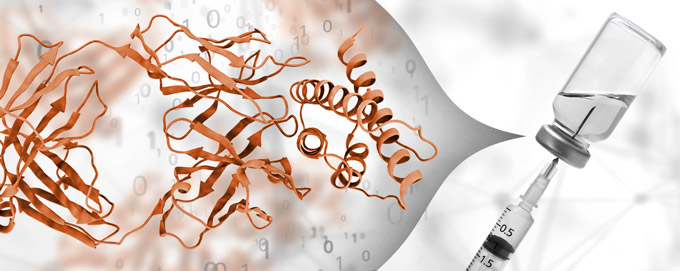
From spotting clues at a crime scene to predicting and preventing wildfires, artificial intelligence (AI) is helping humans solve complex challenges. AI is transforming animal health drug discovery, too.
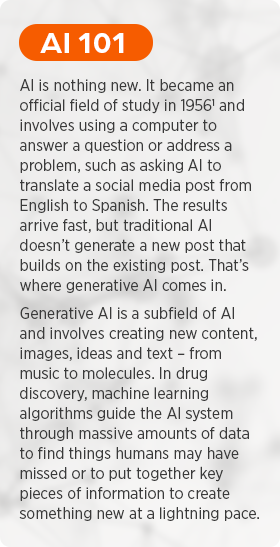
“Drug discovery is complicated and unpredictable. There are more failures than successes,” said Andrea Gonzales, who was the Vice President, Automation & Data Sciences in Zoetis’ research and development (R&D) organization before she retired in 2025. “It’s important to make decisions quickly, adapt and learn from our failures as much as our successes. To do that, we are hoping to revolutionize our approach to R&D by unlocking the full value of our data and making the process faster, more precise and less biased. AI, digital tools and data are enabling that transformation.”
Below are three ways Zoetis scientists are working to harness AI, shrink the timeline from discovery to product launch and advance animal health around the world.
#1: Exploiting data for better drug design
For an AI tool to generate anything, it needs data. “You have to feed the tools information,” said Andrea. “AI tools require vast amounts of data to learn from. Algorithms – a set of instructions designed to solve a specific problem or perform a certain task – are the brains behind AI. The more data you can feed in, the better instructions AI will develop, leading to more accurate outputs and continuous learning and adaptations from the new data it encounters.”

Zoetis’ clinical data management system (CDMS) includes data from more than 20,000 clinical trials across species. Additionally, a wealth of non-clinical data is stored in various systems across R&D, including hundreds of terabytes of data that provide insights into an animal’s molecular and cellular functions and the complex networks that keep living systems functioning. More recently, Zoetis gained access to an abundance of pet genetics data through the acquisition of Basepaws. Scientists also mine external literature, such as human and animal health databases, scientific publications and academic studies.
All of these disparate data sources need to be evaluated to determine the underlying cause of disease and the ability of therapies or vaccines to affect disease – a daunting task for a human to undertake without assistance.
“Years ago, we read scientific papers, one at a time, and then made decisions about what to pursue,” said Susan Huse, Research Director at Zoetis who specializes in data sciences, AI and analytics. “It was time-consuming, costly and biased.”
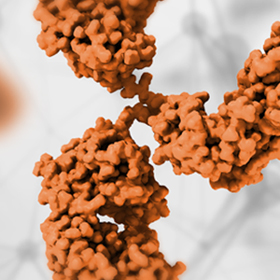
Now, data scientists are working to exploit massive amounts of data by using AI to find and evaluate potential new drug targets virtually or through computer simulations. For example, AI can extract data to create a model of an animal’s immune system to show how a disease works in one species versus another – insights that could lead to more targeted therapies.
The team is using Biograph, an AI-powered tool that integrates vast biodata into a knowledge graph, to identify potential new therapies. For example, the tool generates virtual efficacy scores to identify key gene connections and gain a deeper, faster understanding of biomarkers and targets involved in chronic kidney disease, a complex disease that affects 80% of cats by age 132,3 and 10% of elderly dogs.4
"We’re reimagining drug discovery...so we can get better therapeutics to our customers as soon as possible."
Susan Huse, Research Director, Zoetis
“We’re building out ways to identify, evaluate and design new therapies in the computer first so we can remove therapies that are likely to fail in clinical trials and instead focus on therapeutics that are likely to succeed by predicting whether they will safely and effectively impact disease, making drug discovery many times faster,” said Susan. “In other words, we’re reimagining drug discovery. We’re using advanced computational methods to get the most out of data so we can get better therapeutics to our customers as soon as possible.”
#2: Investing in innovation
Zoetis has invested heavily in data capabilities for more than a decade, and the application of AI and digital tools across the company builds on that track record.
“Our goal is to establish Zoetis as the AI leader in animal health,” said J.D. Williams, Vice President, Chief Data and Analytics Officer at Zoetis. “That includes investing in AI and digital capabilities that impact our entire organization – manufacturing, commercial operations and R&D.”
For example, in 2024, Zoetis expanded its R&D organization by creating the Automation & Data Sciences group. Teams there apply new technologies and create digital and analytics tools to generate data-driven insights, automate R&D processes, enhance data management and accelerate decision-making.
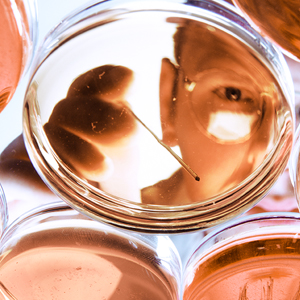
In addition, Zoetis is continuously expanding and upgrading research labs in Kalamazoo, Michigan, Olot, Spain, Beijing and Suzhou, China, and other R&D locations across the globe. Since 2020, Zoetis has extended its research footprint into Fort Collins, Colorado, Cambridge, UK, and Munich, Germany, all of which house scientists with expertise in protein sciences, biology, mechanistic biology, new technologies and data sciences.
These and other investments are expected to accelerate animal health drug discovery. It’s already working in human health. In 2023, at least 14 new therapies fully generated by AI had entered human health clinical trials.5 “Over the next few years, all forms of AI, machine learning and predictive analytics will be just as transformational for animal health,” said Annie Janssen, Senior Director, Automation & Data Sciences. “By investing in innovation, we are now in a position to reshape how we integrate digital and data insights into every phase of R&D.”
Zoetis is also making significant investments in a new clinical data management system, which will pilot in 2025. The new system will have embedded AI capabilities that will improve data quality, reduce manual data validation efforts and enhance data review by Zoetis clinicians and scientists. There is also a generative AI-powered project underway to speed up the drafting of study reports, possibly cutting in half the time to prepare regulatory filings.
“The investments we are making in data infrastructure and novel approaches will allow us to leverage the power of all the data we’ve collected and get the best medicines and vaccines to our customers as soon as possible,” said Bindu Vanimisetti, Senior Director, Automation & Data Sciences.
#3: Bringing together the brightest minds to solve complex problems
Although AI can analyze huge amounts of data, generate molecules and optimize their design much faster than humans, Susan said technology will never replace the brilliance of the human mind. “We’re using the tools to remove repetitive tasks, but it is the human who is evaluating what comes from the learning tools. The data is the foundation, but it is the integration of data and technology with exceptional, creative data scientists, working together that turn data into actionable knowledge.”
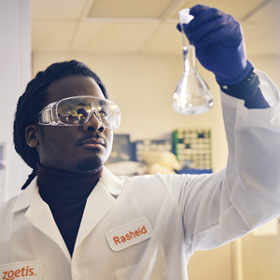
Zoetis is the leading animal health company in the world, “and we have some of the best and brightest scientists,” said Matt Vert, Zoetis’ Vice President and Head of Tech and Digital for R&D and Precision Animal Health. “We’ve also always understood that collaboration drives success. Partnering beyond our walls can help advance animal health across some of the most complicated diseases.”
Zoetis’ External Innovation group is charged with discovering and bringing new innovations into the company. Each year, the group receives hundreds of partnership proposals through a public website and engages in hundreds of meetings with potential collaborators.
“Bio International is a great place for us to meet today’s technology innovators. It’s the largest convention for biology in the human health space, and you don’t typically see many animal health companies there,” said Seth Boudreaux, Zoetis’ Director, External Innovation. “We have face-to-face rapid-fire meetings – like speed dating – to match innovators to the gaps we have in our research pipeline.”
Seth’s group is looking for “innovations that will help scientists better understand animal diseases at the molecular level, how to pick better targets and generate substrate, and ways to intervene earlier in the course of disease with personalized approaches.”
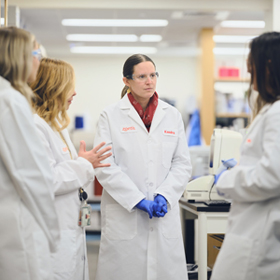
Through it all, “data is the crown jewel,” said Seth. “I’m on the lookout for any integrated animal health datasets that specifically connect biomolecular data to disease.”
To extend its reach, Zoetis has multiple alliances with universities and venture capitalists who help Zoetis establish an innovative ecosystem. For example, the Vanguard crLyme vaccine, targeting Borrelia burgdorferi, was born from a collaboration between Zoetis and a university lab, a partnership that leverages external research to advance new veterinary solutions.
The future of drug discovery
Annie anticipates that technology will transform Zoetis’ research organization in the next two years. “We expect that the appropriate use of AI, automation, digital and data will drive more informed decision-making, accelerate the discovery process, reduce fail rates and allow us to advance animal health in ways we could only imagine a decade ago. We are well on our way.”
Published on November 21, 2024
All trademarks are the property of Zoetis Services LLC or a related company or a licensor unless otherwise noted. © 2025 Zoetis Services LLC. All rights reserved.
References
1 Appendix I: A Short History of AI | One Hundred Year Study on Artificial Intelligence (AI100)
2 Prevalence and classification of chronic kidney disease in cats randomly selected from four age groups and in cats recruited for degenerative joint disease studies - PubMed (nih.gov)
3 Chronic Kidney Disease (CKD) in Dogs and Cats - The Animal Medical Center (amcny.org)
4 IBID
5 Full article: Generative artificial intelligence empowers digital twins in drug discovery and clinical trials